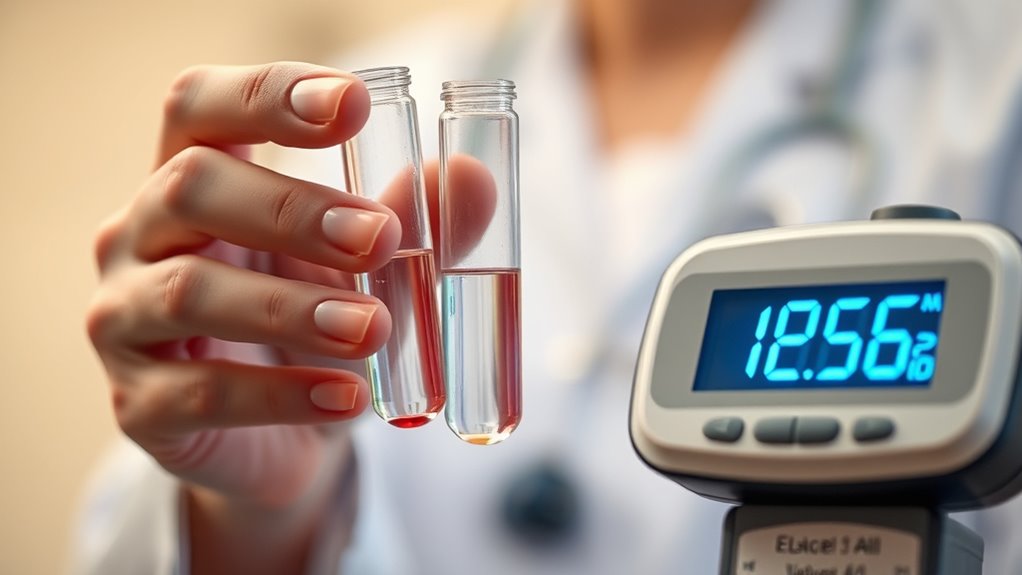Testosterone in women over 40 plays a key role in maintaining libido, bone strength, muscle mass, and overall energy. As you age, levels naturally decline, affecting your vigor, mood, and sexual well-being. High or low levels can cause noticeable symptoms, so monitoring helps manage these changes effectively. If you want to understand how balancing your testosterone supports your health and quality of life, keep exploring what you need to know.
Key Takeaways
- Testosterone supports bone density, muscle strength, and overall physical vitality in women over 40.
- It plays a crucial role in enhancing libido, sexual arousal, and satisfaction during and after menopause.
- Levels naturally decline with age, affecting mood, energy, mental clarity, and reproductive health.
- Proper testing (preferably blood tests in the morning) is essential for accurate assessment of testosterone status.
- Maintaining balanced testosterone levels can help mitigate age-related symptoms and improve quality of life.
Understanding Normal Testosterone Levels in Women Over 40

Understanding what constitutes normal testosterone levels in women over 40 is essential for evaluating your hormonal health. Typically, adult women have levels ranging from 8 to 60 ng/dL, though postmenopausal women often fall between 7 and 40 ng/dL. Some labs, like WebMD, report normal levels as 15-70 ng/dL, reflecting testing variability. As you age, your testosterone naturally declines due to reduced ovarian and adrenal function. Most sources agree that levels above 60-70 ng/dL are considered high for women. Monitoring these levels helps identify potential issues; however, normal ranges can differ based on lab methods. Understanding your baseline allows you to recognize abnormal fluctuations and seek appropriate medical advice to maintain hormonal balance. Regular testing can assist in tracking hormone levels and ensuring overall well-being. Additionally, being aware of hormonal fluctuations can help you better understand changes in your mood, energy, and overall health. Recognizing the normal ranges aids in distinguishing healthy variations from potential abnormalities, facilitating informed health decisions.
How Testosterone Changes With Age and Menopause

As you age, your testosterone levels gradually decline, especially during perimenopause and menopause. This decrease is influenced by hormonal shifts, including drops in estrogen and changes in ovarian and adrenal function. Understanding these patterns can help you better manage symptoms and maintain overall health.
Testosterone Decline Over Time
Testosterone levels in women naturally decline with age, especially after reaching their 40s. During your 20s, levels are at their peak, but they gradually decrease over time. By menopause, your testosterone drops to about a quarter of its peak, with a more noticeable decline between ages 45 and 55. After age 65-70, levels tend to stabilize and become similar to those in younger women. This decline affects many aspects of health, including bone density, muscle mass, mood, energy, and sexual desire. Factors like age and surgical procedures, such as oophorectomy, accelerate this process. Understanding this natural decline helps you recognize symptoms like fatigue, reduced libido, or mood changes, and consider therapeutic options if needed. Additionally, hormone fluctuations can influence overall health and well-being during this stage of life, as hormonal changes can impact multiple bodily systems. Testosterone decline naturally influences various health outcomes in women over 40.
Menopause and Hormonal Shifts
During menopause, your hormonal landscape shifts markedly, with a gradual decline in testosterone levels that often goes unnoticed compared to the more dramatic drop in estrogen. This decline impacts your libido, energy, bone density, and muscle mass. You might notice reduced sex drive, fatigue, or cognitive changes, even if your testosterone levels are still within a normal range. Unlike estrogen, testosterone decreases slowly over time, especially during natural menopause. For some women, this decline can contribute to symptoms that affect daily life. Testosterone therapy may be considered when low libido or other symptoms persist despite hormone replacement therapy (HRT). Monitoring and tailored treatment help manage these hormonal shifts, supporting your overall health, mood, and physical well-being during this transitional phase. Additionally, understanding the hormonal changes that occur during menopause can aid in developing effective strategies for maintaining vitality and well-being. Recognizing the age-related decline in testosterone levels can help women make informed decisions about their health management options. Being aware of hormonal fluctuations can also empower women to seek appropriate medical guidance when managing symptoms. Recognizing these hormonal shifts can also guide lifestyle adjustments that support hormonal balance and overall health, such as incorporating specific lifestyle modifications that promote hormonal health.
Recognizing Symptoms of Low Testosterone in Women

Recognizing symptoms of low testosterone in women can be challenging because many signs overlap with other health conditions or hormonal changes. You might notice a decreased libido or difficulty arousing and achieving satisfaction during sex. Vaginal dryness can make intercourse uncomfortable, and reproductive issues like irregular cycles or trouble conceiving may occur. Mentally, low testosterone can cause brain fog, memory problems, and reduced focus, affecting your daily functioning. You might also feel more anxious, depressed, or irritable, with low energy and persistent fatigue. Physical signs include muscle weakness, weight gain, dry skin, and hair loss. These symptoms can develop gradually, often mistaken for aging or menopause, making it essential to consult your healthcare provider for proper evaluation and diagnosis. Additionally, understanding the hormonal changes that occur after 40 can help differentiate between normal aging and symptoms of low testosterone.
Signs and Effects of Excess Testosterone in Women

While low testosterone symptoms are often mistaken for aging or menopause, excess levels can produce a different set of noticeable signs. You might notice acne and oily skin, caused by increased sebum production, or experience unwanted hair growth on your face, chest, or back. Thinning hair or hair loss on your scalp is another common sign. Irregular menstrual cycles and mood swings may also occur, reflecting hormonal imbalances. Physical changes include a deeper voice, increased muscle mass, and a reduction in breast size. Some women develop an enlarged clitoris or frontal balding. These signs can impact your self-esteem and overall well-being. Additionally, affairs – cheating husband secrets can sometimes be linked to hormonal imbalances, affecting behavior and judgment. If you observe these symptoms, it’s essential to consult a healthcare provider for proper diagnosis and management. Recognizing the role of AI security in healthcare can help ensure accurate diagnosis and safe treatment options. Proper understanding of hormonal health is vital for addressing these issues effectively, especially since crochet styles for locs can serve as a protective hairstyle that supports scalp health and confidence. Furthermore, understanding the precious metals market can assist in diversifying your investments and securing your financial future.
The Impact of Testosterone on Bone Health and Density

Testosterone plays a crucial role in maintaining bone health and density in women over 40, especially as hormone levels decline with age. If your testosterone levels drop below 30 ng/dL, you might face increased osteoporosis risk and weakened bones. Restoring healthy levels can:
- Strengthen your bones, reducing fracture risk.
- Support bone formation by stimulating osteoblast activity.
- Balance bone remodeling by decreasing resorption and promoting repair.
Research shows a direct link between testosterone and bone mineral density (BMD), especially in postmenopausal women. Testosterone therapy, whether through natural support or medical intervention, can help preserve your skeletal strength. Maintaining ideal testosterone levels not only protects against bone deterioration but also helps you feel more resilient and confident as you age.
Role of Testosterone in Maintaining Muscle Mass and Strength

Testosterone helps boost muscle protein synthesis, which is essential for maintaining muscle mass as you age. When levels decline, your muscles become more prone to loss, increasing the risk of weakness and frailty. By supporting muscle growth and preventing age-related decline, testosterone plays a key role in preserving your strength and function.
Muscle Protein Synthesis
As women age, maintaining muscle mass and strength becomes increasingly important, and hormones play a key role in this process. Testosterone boosts muscle protein synthesis, helping you preserve and build muscle. Higher testosterone levels, like in women with PCOS or obesity, can considerably enhance this process. You can experience:
- Increased strength and endurance, empowering you daily.
- Better muscle tone, boosting your confidence.
- Reduced risk of age-related frailty, keeping you active and independent.
Testosterone’s influence on muscle protein synthesis is essential for overall muscle health. It acts as an anabolic agent, promoting protein buildup necessary for muscle maintenance. Even in older women, moderate testosterone levels can help counteract age-related declines, supporting your vitality and resilience. Additionally, understanding the role of testosterone in muscle protein synthesis can help inform strategies for maintaining muscle health as you age.
Preventing Age-Related Loss
A natural decline in testosterone levels as you age can markedly impact your muscle mass and strength. As testosterone decreases, you may notice increased frailty and poorer physical performance. Since testosterone plays a vital role in maintaining muscle, especially through its anabolic effects on skeletal tissue, lower levels can accelerate age-related muscle loss. Supplementing with testosterone has been shown to increase muscle mass and strength in women, with effects that are dose-dependent. Short-term therapies can boost trunk muscle area and improve physical function. Additionally, AI-powered health monitoring tools are increasingly used to track hormonal changes and optimize treatment plans. Understanding hormonal imbalances can help tailor personalized approaches to maintain muscle health effectively. While testosterone therapy offers benefits, it’s essential to take into account potential risks, such as masculinizing effects. Maintaining healthy testosterone levels, along with proper nutrition and exercise, can help prevent the muscle decline common in women over 40. Moreover, understanding the hours of beauty stores can help women plan their health and beauty routines effectively. Incorporating testosterone level assessments into regular health check-ups can further aid in early detection and management of hormonal imbalances. Additionally, research suggests that natural techniques for hormone balance, such as lifestyle modifications and organic therapies, may support long-term health and hormone regulation.
Influence of Testosterone on Libido and Sexual Well-being

For women over 40 experiencing decreased libido, testosterone often plays a notable role in enhancing sexual desire and overall well-being. You might notice improvements in multiple areas, such as:
- Restored desire, making intimacy more enjoyable and fulfilling.
- Increased pleasure, arousal, and satisfaction during sex.
- Boosted self-image and confidence, helping you feel more attractive and vibrant.
Testosterone can also improve blood flow to your genitals, which may enhance your sexual response. Additionally, many women experience better mood, motivation, and cognitive clarity, contributing to a healthier, more satisfying sex life. Understanding the flushing mechanisms involved in your body can help you appreciate how hormonal changes impact your overall health. While the effects are subtle, these changes can considerably impact your confidence and emotional connection, helping you feel more alive and engaged in your intimacy. Recognizing the role of hormonal balance in your health can further support your well-being during this stage of life.
Factors That Can Alter Testosterone Levels in Women Over 40

Your testosterone levels can be influenced by hormonal changes during menopause and other factors like lifestyle and weight. As you age, your body’s natural hormone production shifts, often leading to declines. Additionally, habits such as diet, exercise, and stress levels can considerably impact your hormone balance.
Hormonal Changes During Menopause
Hormonal changes during menopause can substantially alter testosterone levels in women over 40, influenced by various factors. These changes can lead to noticeable shifts in your energy, mood, and libido.
Consider these key impacts:
- A *sudden drop* in testosterone if you undergo surgical menopause, like oophorectomy.
- Temporary *increases* during menopause caused by decreased SHBG, but these are minor.
- Fluctuations in SHBG levels affect how much bioavailable testosterone you have, influencing symptoms like fatigue or low libido.
As your ovaries and adrenal glands decline in function, testosterone production diminishes, affecting your overall well-being. Understanding these hormonal shifts helps you better manage menopausal symptoms and maintain balance during this stage.
Lifestyle and Weight Factors
Lifestyle choices and weight management play significant roles in influencing testosterone levels in women over 40. Eating a balanced diet with fruits, vegetables, nuts, and whole grains supports hormonal health. Regular aerobic and resistance exercises help boost testosterone naturally. Prioritizing good sleep is essential for hormonal balance, while managing stress through relaxation techniques or exercise prevents hormone disruptions. Limiting exposure to environmental toxins like BPA and phthalates is also beneficial. Maintaining a healthy weight and BMI can increase testosterone levels, especially by reducing visceral fat, which negatively affects hormones. Consistent exercise, even moderate, supports weight stability and metabolic health. Additionally, nutritional supplements such as zinc, magnesium, omega-3s, and vitamin B can promote hormone production. Overall, adopting these lifestyle approaches can positively influence testosterone levels and overall well-being.
Diagnostic Methods for Assessing Testosterone Levels

Evaluating testosterone levels in women over 40 involves several diagnostic methods, each with distinct advantages and limitations. You should consider:
- Total testosterone tests, which measure both bound and free testosterone, giving an overall picture of hormone levels.
- Free testosterone tests, isolating the biologically active hormone, essential when symptoms persist despite normal total levels.
- Saliva tests and at-home kits, offering convenience but with limited accuracy, often needing confirmation via blood tests.
Laboratory methods like LC-MS/MS provide high sensitivity and precision, especially for low levels common in women. Blood samples are typically drawn in the morning due to diurnal variation, ensuring more accurate results. Accurate assessment guides proper diagnosis and management of hormonal imbalances.
Treatment Options and Lifestyle Strategies to Balance Testosterone

When considering how to manage low testosterone levels in women over 40, exploring available treatment options and practical lifestyle strategies can make a significant difference. Hormone Replacement Therapy (HRT) can be combined with testosterone to improve libido and sexual function, while low-dose testosterone therapy may help if HRT isn’t enough. Keep in mind, no testosterone treatments are FDA-approved for women, so you’ll need medical supervision and regular blood tests to ensure safety. Alongside medical options, lifestyle changes can support hormone balance. Regular exercise, a balanced diet, stress management techniques like yoga, and good sleep are crucial. Limiting alcohol intake also helps maintain hormonal health. These combined strategies can enhance your overall well-being, energy, and sexual health as you navigate menopause.
Frequently Asked Questions
Can Herbal Supplements Effectively Boost Testosterone in Women Over 40?
You’re wondering if herbal supplements can effectively boost testosterone in women over 40. While some herbs like ashwagandha and tribulus terrestris may influence hormone levels, research is limited and results vary. You should be cautious because supplements aren’t well-regulated, and side effects or interactions could occur. Before trying any, it’s best to consult your healthcare provider to ensure safety and discuss potential benefits and risks.
Are There Natural Ways to Reduce High Testosterone Levels?
If you’re wondering whether natural methods can lower high testosterone, you’re in luck. You can embrace herbal hints like spearmint tea and reishi mushrooms, which have been shown to help reduce levels. Pair these with powerful plant-based foods such as leafy greens and omega-3-rich fish. Regular exercise, especially high-intensity interval training, and maintaining a healthy, balanced diet can also help tame testosterone levels naturally. Always check with your healthcare provider before making changes.
How Does Stress Impact Testosterone Levels in Women?
You might notice stress impacts your testosterone levels by disrupting hormone balance through elevated cortisol. When you’re stressed, your HPA axis activates, often lowering testosterone, which can affect your energy, mood, and libido. Your individual stress response varies, influenced by traits like anxiety or coping skills. To keep levels steady, try stress management techniques, like mindfulness or exercise, and make lifestyle adjustments to support your hormonal health.
Is Testosterone Replacement Safe for Women Over 40?
You might worry about safety, but testosterone replacement can be safe for women over 40 when used in physiological doses and monitored properly. Transdermal applications are preferred for their safety profile. While long-term data is limited, benefits like improved libido, bone health, and potential breast cancer risk reduction are promising. Just make certain you consult a healthcare provider to tailor the therapy and keep levels within healthy ranges.
Can Diet Alone Regulate Hormone Imbalances Related to Testosterone?
You wonder if diet alone can regulate hormone imbalances related to testosterone. While eating a balanced diet rich in healthy fats, vegetables, and adequate protein can support hormonal health, it might not fully correct imbalances on its own. Your lifestyle factors like exercise, sleep, and stress management also play crucial roles. Combining these habits with dietary changes gives you the best chance to balance your hormones effectively.
Conclusion
Understanding your testosterone levels helps you recognize your body’s needs, manage your health, and embrace your vitality. By staying informed, monitoring symptoms, and taking proactive steps, you can balance your hormones, boost your well-being, and reclaim your confidence. Because knowing your hormones empowers you, caring for your health sustains your strength, and embracing your journey enhances your life. In balancing your testosterone, you nurture your body, honor your spirit, and release your full potential.









